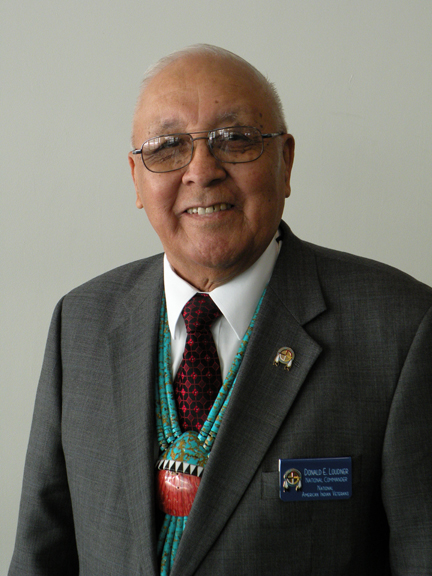
Donald Loudner, an enrolled member of the Crow Creek Sioux Tribe, was once again named to the U.S. Census Bureau’s National Advisory Committee on Racial, Ethnic and Other Populations.
Loudner maintains seat on Census Bureau diversity committee
By Brandon Ecoffey
Native Sun News Staff Writer MITCHELL — On Oct. 12, Donald Loudner, an enrolled member of the Crow Creek Sioux Tribe, was once again named to the U.S. Census Bureau’s National Advisory Committee on Racial, Ethnic and Other Populations. The National Advisory Committee will work to help guide the Census Bureau in multiple areas including, housing, children, youth, privacy, race and ethnicity, and gay, lesbian and transgender populations. Thomas Mesenberg, the Census Bureau’s acting director, said in a news release, “We expect that the expertise of this committee will help us meet the challenges the Census Bureau faces in producing statistics about our diverse nation. By helping us better understand the variety of issues that affect statistical measurement, this committee will help ensure that the Census Bureau continues to provide relevant and timely statistics used by federal, state and local governments as well as business and industry in an increasingly technologically oriented society.” Loudner, who has served on the committee for the last 10 years, told Native Sun News, “I am very proud to be on the committee again.” During his time on the committee he has held multiple posts and has served as both the chairman and the vice chairman of the committee. While working with the Census Bureau, Loudner has seen progress in regard to how Indian country has been accounted for during the once-a-decade count that the bureau conducts. “When I first got on there the count was very low, and I brought the director out to South Dakota and we toured a couple of reservations,” Loudner recalled. “And when we got there I said there is one thing your people need to do to get a better count: They have to get out of those shirts and ties and get a pair of blue jeans on so people will not think you are the FBI or an IRS agent.” He went on to say, “It is an important committee for the Indians because the count that they release goes to the federal agencies who provide the funding. And they use the amount of people they get on the count to determine how much money to distribute, and if we undercount then the tribe is losing money.” In addition to providing the Census Bureau with advice on how to work at the grassroots level in Indian country, Loudner has also helped to give them a better understanding of how the federal government should work with tribes when trying to gather information on tribal lands. “You can’t just show up unannounced and expect the tribes to work with you,” he said of Census Bureau officials. “(Tribes) are sovereign nations and it is important that you ask if you can operate on tribal lands, and then go from there.” Although Loudner says that this may be his last term on the committee he still has several initiatives that he hopes to accomplish while serving on the board. Unlike other underrepresented peoples, Native Americans still do not have a position the Census Bureau’s central office in Washington, D.C. — and Loudner hopes to change that. “I have been pushing to get a senior position in Washington for the Indians because we still don’t have an open door to the director,” he said. Loudner, who has been an American Legion member for 50 years and is a lifetime member of Disabled Veterans of America, is a well-known advocate for Native American veterans, and is a veteran of the Korean War himself. He served in the U.S. Army from 1950 until 1983, retiring at the rank of chief warrant officer. He also has worked for the Department of the Interior and its subdivision, the Bureau of Indian Affairs, as an agency superintendent and is currently the first commander for National American Veterans Inc. (Contact Brandon Ecoffey at staffwriter2@nsweekly.com)
Join the Conversation
